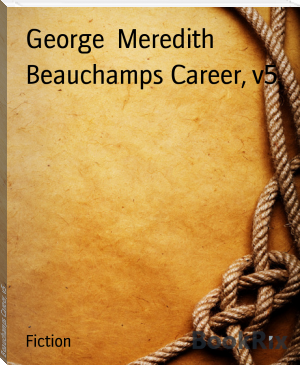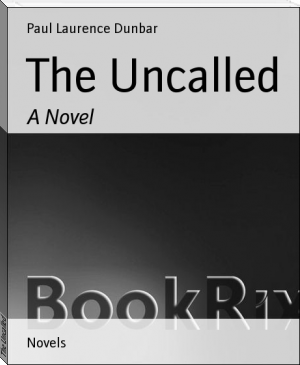Both Sides the Border: A Tale of Hotspur and Glendower by G. A. Henty (literature books to read .txt) 📗

- Author: G. A. Henty
Book online «Both Sides the Border: A Tale of Hotspur and Glendower by G. A. Henty (literature books to read .txt) 📗». Author G. A. Henty
"That is true enough," the men laughed. "Well, go thy way. There is naught to be gained from a travelling monk."
"Naught, good friend, save occasionally hard blows, when the monk happens to be of my strength and stature, and carries a staff like this."
"'Tis a goodly weapon, in sooth, and you look as if you knew how to wield it."
"Even a monk may know that, seeing that a staff is not a carnal weapon."
And rolling up his sleeves, Roger took the staff in the middle with both hands, in the manner of a quarterstaff, and made it play round his head; with a speed, and vigour, that showed that he was a complete master of the exercise.
"Enough, enough!" the man said, while exclamations of admiration broke from the others. "Truly from such a champion, strong enough to wield a weapon that resembles a weaver's beam, rather than a quarterstaff, there would be more hard knocks than silver to be gained; but it is all the more pity that such skill and strength should be thrown away, in a convent. Perhaps it is as well that you are wearing a monk's gown, for methinks that, eight to one as we are, some of us might have got broken heads, before we gained the few pence in your pocket.
"Come on, men. Better luck next time. It is clear that this man is not the one we are charged to capture."
And, with his followers, he rode off across the moor.
"I do not think that they are what they seem," Oswald said, as they resumed their journey. "The man's speech was not that of a border raider, and his followers would hardly have sat their horses so silently, and obeyed his orders so promptly, had they been merely thieving caterans; besides, you marked that he said you were not the man they were watching for."
"Whom think you that they are, then, Master Oswald?"
"I think it possible that they may be a party of Douglas's followers, led by a knight. It may be that Douglas has received some hint of March's being in communication with England; and that he has sent a party to seize, and search, any traveller who looked like a messenger from the south. Of course, this may be only fancy. Still, I am right glad that you were wearing your monkish robe; for, had I been alone, I might have been cross-questioned so shrewdly as to my purpose in travelling, that I might have been held on suspicion, and means employed to get the truth out of me."
At the small town where they stopped, next night, they learned that many complaints had been made, by travellers from the south, of how they had been stopped by a party of armed men on the border, closely questioned, and searched, and in some cases robbed. This had been going on for some weeks, and the sheriff of the county had twice collected an armed force, and ridden in search of the robbers, but altogether without success. It was believed that they were strangers to the district, and the description given of them had not agreed with those of any noted bad characters, in the neighbourhood.
"Certainly, Master Oswald," the monk said, "all this seems to support your idea. Money and valuables are soon found; but by what these men say of the way in which the clothes and belongings of these travellers were searched, it would seem to show that money was not the object of the band, but rather the discovery of correspondence, and that money was only taken as a cloak."
"I have no doubt that they were there to intercept someone, Roger, though it may not have been Percy's messengers; still, we are well rid of them, and I hope that we shall meet no more, on our way."
The hope was fulfilled, and they reached Dunbar without further interruption. Here they deemed it better to separate. The monk went to a convent, and gave out there that he was on the way to Edinburgh, being on a journey thither to see his aged father, who was in his last sickness. Oswald went to a shop, and bought clothes suited for the son of a trader in a fair position; and, changing his things at the inn where he had put up, made his way to the castle.
"I would have speech with the earl," he said, to the warder at the gate. "I have his orders to wait upon him."
"What is your name and condition?"
"That matters not. I am here by the earl's orders. He sent me a ring, by which it might be known that I am authorized to have access to him."
On seeing the ring, the warder at once called to one of the servitors, and bade him conduct Oswald to the earl's apartment.
"Whom shall I say?" he asked, when he reached the door.
"Give this ring to him, and say that the bearer awaits admittance to him."
The man entered the room and then, opening the door again, motioned to Oswald to enter. The earl, a tall and powerfully-built man, looked with a keen scrutiny at him.
"From whom come you, young sir?"
"From the holder of that ring, my Lord Earl," Oswald said, presenting the ring that Percy had given him. "My name is Oswald Forster, and I have the honour to be one of Lord Percy's esquires."
"Come you alone?" the earl asked.
"I came with a companion, a monk. I was in the disguise of a young servitor of his convent. We came on foot from Roxburgh."
He then unscrewed the handle of a dagger Percy had given him, for the purpose, and pulled out a small roll of paper, which he handed to the earl. It contained only the following words:
"Do not intrust undue confidence in the bearer. The matters you wot of are in good train; of them my messenger knows nothing."
"This was so writ by Sir Henry Percy," said Oswald, "in order that, if I were detained and searched on the way, and this paper found on me, I might not be forced, by torture, to say aught of my message."
"But this signet ring would have shown to whom you were coming."
"It was concealed in my staff, my lord, and could not have been discovered, had not that been split open. Had it been so, I should have admitted that Lord Percy had indeed committed the signet and the writing to me to carry, and had bid me travel as the servitor of a monk on his journey north; but that, more than that these were to be delivered to you, I knew nothing. Lord Percy selected me as his messenger partly because, from my youth, I should not be likely to be suspected of being a messenger between two great lords; and in the second place because, if arrested, and these matters found on me, the statement in the letter would be readily believed. It would not be supposed that important state secrets would be committed to a lad, like myself."
The earl made no reply, for a time, but sat with his eyes fixed on Oswald's face, as if he were reading him thoroughly.
"Then you do know the matters in question?"
"I do, my lord. I am the bearer of a further communication to you."
"Say on, then."
"Lord Percy bids me say that, on the receipt of your message to him, he forwarded it by one of his knights to the king at Westminster; and that the matter was discussed, by his majesty, with two or three of his most trusted councillors. After full consideration, the king has accepted your offer, and will grant all its conditions. He sent, my lord, also a document with his royal seal attached, engaging to observe all the conditions of the compact. This document Lord Percy holds, to be given to you on a convenient occasion; but he deemed it of so important a nature that it would be too hazardous to send it to you. The king, in a letter to Lord Percy, begged him to tell you that, so long as the truce continued, he could not collect an army to support you; but that, as the time for its termination approached, he would begin to do so, and would be in readiness to take the field, in the north, immediately you move in the matter."
The earl sat for some time, in thought.
"Do you know the conditions of the compact?" he asked, suddenly.
Oswald had expected this question, and felt sure that the earl, who was, when not inflamed by anger, a cool and cautious man, would highly disapprove of Hotspur's frankness; and might possibly detain him, if he knew that he possessed so important a secret. He therefore replied:
"As to such grave matters, it was not necessary that I should know more than I have said to you, my Lord Earl. As it is no secret that you and the Douglases have personal enmity, I deemed that the compact referred to our king giving you aid, should you need it against the Douglases."
The answer was apparently satisfactory. The earl asked no further questions, on this head.
"Were there other reasons than those you have stated why he chose you as his messenger?"
"Another reason he gave me, my lord, was that, as I came of a family who reside within a few miles of the border, and had relatives on this side whom I sometimes visited, my language was similar to that spoken in Roxburghshire; so that I could therefore pass as a Lowland Scot, without difficulty. No one, in fact, at the various places at which we have stopped, has taken me for aught but a countryman; though the monk with me was often taxed with being an Englishman, though belonging to a monastery at Roxburgh."
Again the earl was silent for some time.
"I must think over the message that I shall give you, for Percy," he said. "I like not the delay, though I see that there is good reason for it. As one of Hotspur's esquires, I would fain treat you with all courtesy, and lodge you here; but this might cause question as to who you are, and it were, therefore, better that you should lodge in the town. Have you put up anywhere?"
"I rested for an hour at the sign of the Lion, my lord; engaging a room there, in order to effect a change in my clothes. I left by the back entrance, in order that the change should not be observed."
"It were best that you fetched those you travelled in away, or rather that you returned unnoticed; and, as it is getting dark now, this can doubtless be managed; and, when you sally out, place that cloak over your shoulders to hide your dress as a servitor, and go to the other inn, the Falcon. Say, there, that you are staying for a few days in Dunbar, having come here on business with me; and that I bade you go there, so that I might know where to send for you, if necessary. You can pass for what you seem, a young trader who has come from Edinburgh to arrange, on the part of your father, a cloth merchant there, for a supply of stuffs for the clothing of my retainers."
Oswald carried out his instructions, walked about until it was quite dark, then entered the inn, made his way unobserved to the chamber where he had left his clothes, put these on, made the others up into a bundle, and then went downstairs again and paid his bill; saying, as he did so, that he had found the friends he came to see, and that they had room to take him in. After leaving the house he threw the cloak, which he had carried on his arm, over his shoulders; and put on the cap that belonged to his other dress, and then went to the Falcon Inn, and repeating to the landlord the statement the earl had made, was at once shown to a chamber, with some deference.
"Will your worship have supper here, or in the room below?"
"I will come down," he said. "It is dull work, sitting alone."
Having ordered his supper, with a flask of wine, Oswald again donned his attire as a trader, and went downstairs. Just as he entered the room, in which several persons were sitting, a soldier came in from the outer door. He looked round the room.
"I have a message, from the earl, for the person who was with him, this afternoon."
Oswald at once rose, and went across to him.
"The earl bade me tell you," the soldier said, in a low voice, "that his present furnisher is Robert Micklethwaite, and that his place of business is near the castle gate, at Edinburgh."
"Please thank the earl for the information," Oswald replied, and then returned to his seat.
He had indeed, while dressing, been wondering what name he should give. It





Comments (0)